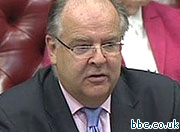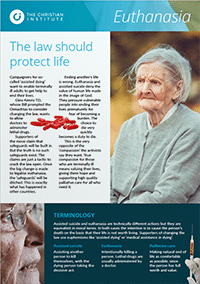Legalising assisted suicide would only be the “start of our experiment with euthanasia”, a Daily Telegraph writer has warned.
Graeme Archer made the comments in response to a Bill from Lord Falconer which would introduce assisted suicide. It is expected to be debated in Westminster later this year.
If the Bill was accepted, Archer said further campaigns, lawsuits and parliamentary Bills would follow, “until safeguard after safeguard was removed”.
Striking
The writer also said Lord Falconer’s Bill, which would apply to England and Wales, could be a slippery slope and has a “striking” parallel to abortion.
Almost fifty years ago the Abortion Act was passed, but in 2012 there were over 200,000 abortions in Great Britain.
Archer commented that while the proposed legislation on assisted suicide is aimed at people with less than half a year to live, “this six-month hurdle feels entirely arbitrary”.
Campaign
He said that some patients are expected to live for much longer than this, which “means that if the Bill were passed, we would only be at the start of our experiment with euthanasia”.
“Lawsuit would follow campaign would follow Private Member’s Bill, until safeguard after safeguard was removed. Be careful what you wish for”, Archer continued.
A similar Bill proposed in Scotland has also faced criticism with a columnist for The Sunday Times warning “the nature of society itself will change” if assisted suicide is introduced.
Protect
Gillian Bowditch cautioned that many “elderly or disabled people already feel marginalised” but introducing assisted suicide would make the situation worse.
While Bowditch commended Margo Macdonald – the MSP behind the Bill – she said her proposed legislation “comes with an inevitable cost to humanity in general”.
“It isn’t simply the medical profession with its ethos of ‘first do no harm’ that finds itself in conflict with the basic premise; our legal profession, police service, social services, the welfare state — the very structure of society — work on the principle that their jobs, in the first instance, are to protect and preserve life.
“If we cross this Rubicon, we have to accept that the nature of society itself will change”, she commented.


